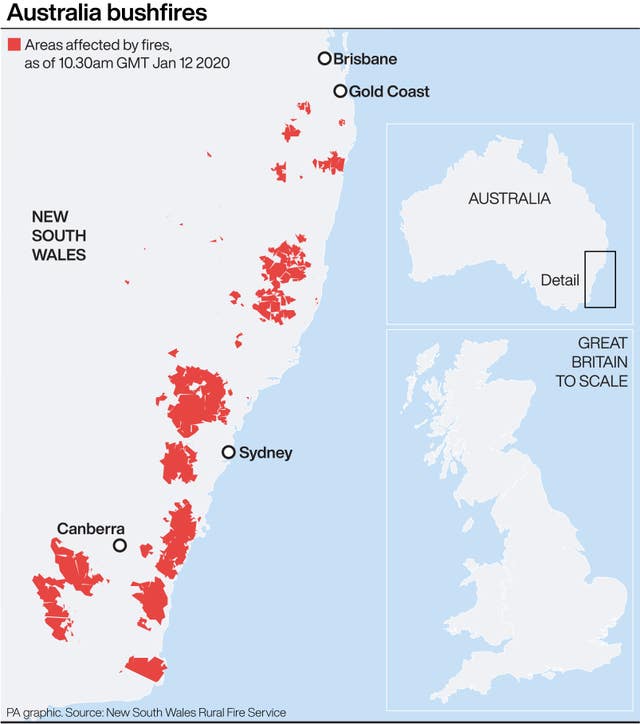Crews battling Australia’s wildfires have said that they have been able to turn from defence to offence for the first time in weeks thanks to a break in the weather.
Dale McLean, who is helping manage the response to a fire near the town of Bodalla in New South Wales state, was part of team that was bulldozing down small trees and burning scrub ahead of the fire’s projected path to try to stop it from reaching a major road by starving it of fuel. He said:
This fire took a major run about seven or eight days ago, and with the weather changing now, the weather settling down, the fire has settled down.
The fire behaviour has changed. So we’re able to get in front of the fire now, get on the offensive

Other workers echoed McLean’s comments, saying cooler temperatures and mild winds have finally offered them a chance to make progress.
The weather is expected to remain benign for the next week, although any deterioration in conditions after that could see the wildfires flare up again.
The progress came after a firefighter was killed by a falling tree.
Bill Slade, 60, died near Omeo in the south-eastern state of Victoria, Forest Fire Management Victoria executive director Chris Hardman said.
The married father of two was commended in November for 40 years of service with the forestry agency.

Hardman said:
Although we do have enormous experience in identifying hazardous trees, sometimes these tree failures can’t be predicted.
Working on the fire ground in a forest environment is a dynamic, high-risk environment and it carries with it significant risk.
The tragedy brings the death toll to at least 27 in a crisis that has destroyed more than 2,000 homes and killed over a billion animals.
The crisis has brought accusations that prime minister Scott Morrison’s conservative government needs to take more action to counter climate chaos, which experts say has worsened the blazes.
Thousands of protesters rallied on 10 January in Sydney and Melbourne, calling for Morrison to be sacked and for Australia to take tougher action on global warming.
#SackScoMo #SackMorrison and let's not vote in anybody that could even remotely be a climate change denier or even slightly buddied up with the coal industry @AlboMP https://t.co/0QUDyMhp21
— Josh (@nonagonmusic) January 12, 2020
https://twitter.com/Elly_333/status/1216329086424870912
The prime minister said that his government was building resilience to the fire danger posed by the current climate breakdown.

He said the government was developing a national disaster risk reduction framework within the Department of Home Affairs that will deal with wildfires, cyclones, floods and drought.
“This is a longer-term risk framework model which deals with one of the big issues in response to the climate changing,” Morrison said.
He said his government accepted that “climate change” was leading to longer, hotter and drier summers, despite junior government politician George Christensen posting on social media over the weekend that the cause of the latest fires was arson rather than man-made climate actions.
Another junior politician, Craig Kelly, has also publicly denied any link between climate chaos and fire crisis.
State authorities have said a minority of fires are deliberately lit.
“The government’s policy is set by the cabinet. Our party room has a broad range of views,” Morrison said of those within government ranks who reject mainstream climate science.
Morrison also announced that 76 million Australian dollars (£40m) would be spent on providing psychological counselling for firefighters and fire-affected communities as part of a previously announced two billion Australian dollar recovery fund.
“There has been a deep scar in the landscape that has been left right across our country,” Mr Morrison said.
“But I am also very mindful, as is the government, of the very real scars that will be there for quite a period of time to come for those who’ve been exposed to the trauma of these bushfires.”
More protests have been called for 18 January:
https://twitter.com/GazmanRocks/status/1216257092253675520
While the fire threat is most acute in rural communities, wildfire smoke that has choked some of Australia’s largest cities is a reminder to many urban Australians of the unfolding disaster.















